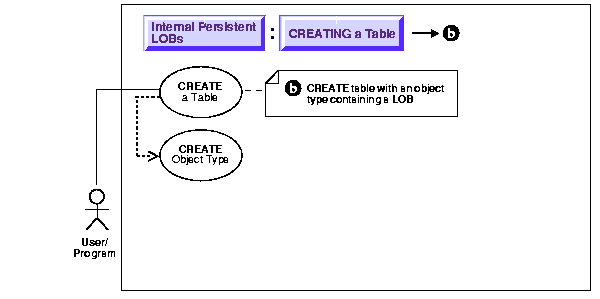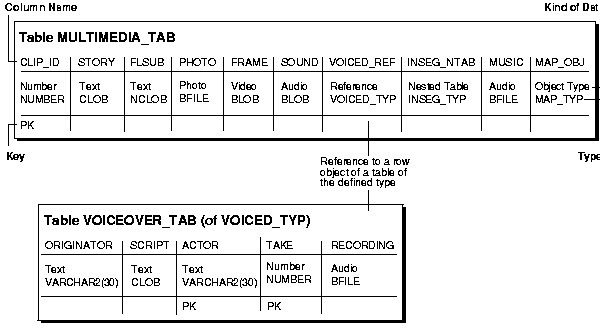Release 1 (9.0.1)
Part Number A88879-01
Home |
Book List |
Contents |
Index | Master Index | Feedback |
| Oracle9i Application Developer's Guide - Large Objects (LOBs) Release 1 (9.0.1) Part Number A88879-01 |
|
Internal Persistent LOBs, 5 of 43

| See: Figure 10-1, "Use Case Model Diagram: Internal Persistent LOBs (part 1 of 2)", for all Internal Persistent LOB operations.: |
This procedure describes how to create a table containing an object type with an LOB attribute.
Not applicable.
See the following specific reference for a detailed syntax description:
As shown in the diagram Figure 10-6, you must create the object type that contains LOB attributes before you can proceed to create a table that makes use of that object type.
The example application illustrates two ways in which object types can contain LOBs:
Table Multimedia_tab contains column Voiced_ref that references row objects in table, VoiceOver_tab.Table VoiceOver_tab is based on type, Voiced_typ. This type contains two kinds of LOBs -- a CLOB to store the script that's read by the actor, and a BFILE to hold the audio recording.
Table Multimedia_tab contains column Map_obj that contains column objects of type, Map_typ. This type uses a BLOB for storing maps as drawings.

The example is provided in SQL and applies to all programmatic environments:
/* Create type Voiced_typ as a basis for tables that can contain recordings of voice-over readings using SQL DDL: */ CREATE TYPE Voiced_typ AS OBJECT ( Originator VARCHAR2(30), Script CLOB, Actor VARCHAR2(30), Take NUMBER, Recording BFILE ); /* Create table Voiceover_tab Using SQL DDL: */ CREATE TABLE Voiceover_tab of Voiced_typ ( Script DEFAULT EMPTY_CLOB(), CONSTRAINT Take CHECK (Take IS NOT NULL), Recording DEFAULT NULL );
Text description of the illustration adl81035.gif /* Create Type Map_typ using SQL DDL as a basis for the table that will contain the column object: */ CREATE TYPE Map_typ AS OBJECT ( Region VARCHAR2(30), NW NUMBER, NE NUMBER, SW NUMBER, SE NUMBER, Drawing BLOB, Aerial BFILE ); /* Create support table MapLib_tab as an archive of maps using SQL DDL: */ CREATE TABLE MapLib_tab of Map_typ;
|
See Also:
Oracle9i SQL Reference for a complete specification of the syntax for using |
|
|
 Copyright © 1996-2001, Oracle Corporation. All Rights Reserved. |
|